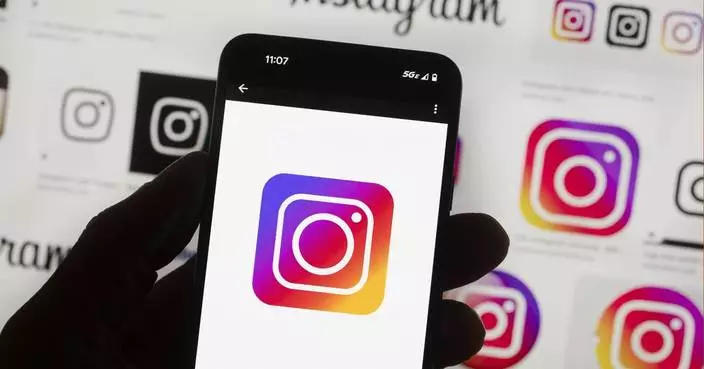Researchers say Islamic State supporters have found an ephemeral platform to share propaganda: Using Instagram's "stories" feature, which causes posts to disappear in 24 hours.
With successive military defeats in Iraq and Syria, many of its recruits dead or on the run and its Twitter and Facebook accounts being shut down, the group's propaganda drive is increasingly homemade. But a recent analysis found the networks of people inspired by the group remain strong elsewhere.
The software analysis identified more than 50,000 accounts linked to Islamic State supporters posting Instagram stories, according to Andrea Stroppa, who is part of the software research group called Ghost Data. Of those 50,000, just over 10,000 are described as strongly-linked to IS — they follow core IS accounts and are followed back, and about 30 percent of their posted content is about the group.
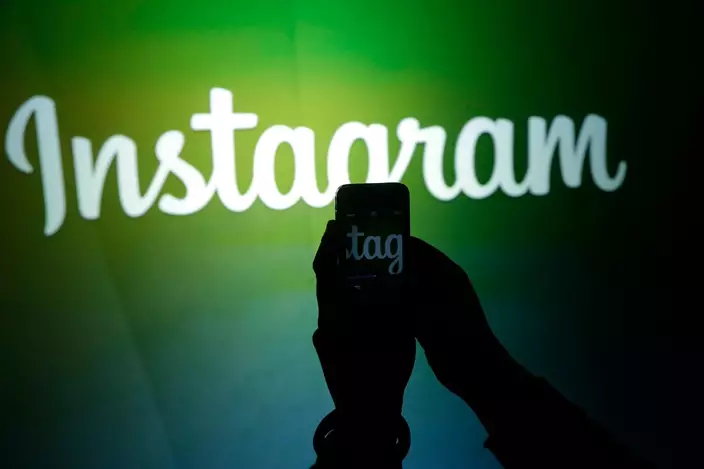
FILE _ In this Thursday, June 20, 2013 file photo, a journalist makes a video of the Instagram logo using the new video feature at Facebook headquarters in Menlo Park, Calif.(AP Photo/Marcio Jose Sanchez, File)
"They send a message that they know will disappear but they know who the audience is. They are using these stories because they know it is a safe channel to share information," said Stroppa, who is also affiliated with the World Economic Forum.
There is no sign that the majority of the posts are from Islamic State's central propaganda units — rather, they tend to be personal snapshots with little production value, like a clip of the IS trademark black flag, or a bloody photo showing what happens to "traitors."
Instagram is owned by Facebook, which came under pressure to close accounts linked to Islamic State supporters after governments said it was being used as a propaganda and recruitment tool. At the height of Islamic State's recruitment drive in the West in 2014 and 2015, the group's propaganda was of a quality unseen in other extremist groups. On Wednesday, the U.N. General Assembly was focusing on extremist content on the internet, with social media front and center.
In a statement Wednesday, Instagram said "There is no place for terrorists, terrorist propaganda, or the praising of terror activity on Instagram, and we work aggressively to remove content or an account as soon as we become aware of it."
The company said its policy prohibits terrorist content, and that it has specialized teams that work to stop the spread of such posts from its platform.
Seamus Hughes, deputy director of the Program on Extremism at George Washington University, said the crackdown by Twitter and Facebook is a big reason why the content is moving elsewhere.
On places like Instagram and Tumblr, "you are usually looking at supporter-driven creations," he said. "I just don't see guys in Raqqa building Instagram stories."
Nathan Patin, who analyzes extremist social media for the website Bellingcat and reviewed the report and database, said the ability to scrape social media for geotags offers new insight into Islamic State supporters. IS supporters still rely primarily upon the encrypted app Telegram, but Patin said they "will use every platform that's available." The difference with Instagram stories, he added, is that they're public and in "one post they're posting Islamic State propaganda and in the next they're posting at a restaurant that's geotagged."
The analysis bolsters a conclusion this week by Policy Exchange, a British think tank, that Islamic State's ability to reconstitute its online networks is undiminished. Policy Exchange found that Islamic State places a premium on speed and agility to move between platforms. It also said IS output of online activity remains consistent, even when the group is under pressure militarily, by finding a "dispersed and resilient form."
SEOUL, South Korea (AP) — South Korean voters have handed liberals extended opposition control of parliament in what looks like a massive political setback to conservative President Yoon Suk Yeol.
Some experts say the results of Wednesday’s parliamentary elections make Yoon “a lame duck” — or even “a dead duck” — for his remaining three years in office. Others disagree, saying Yoon still has many policy levers and could aggressively push his foreign policy agenda.
But it’s certain that the election outcome poses the toughest political challenge to Yoon since the former top prosecutor took office in 2022 for a single five-year term.
Here is a look at what the election results mean to Yoon and South Korean politics.
Even before Yoon's inauguration, South Korea's single-chamber National Assembly was controlled by the liberal Democratic Party. Squabbling with Yoon over a range of issues, Democratic Party lawmakers have frequently limited his domestic agenda.
Yoon badly needed his party to regain a parliamentary majority so they could support his agenda. But his People Power Party and its satellite party only won 108 seats in the 300-member parliament, while the Democratic Party and two other liberal parties took a combined 187 seats.
The incoming parliament has a four-year term, meaning its liberal control will likely continue until after Yoon leaves office in 2027. Yoon's hold on the ruling party could be subsequently weakened because many members' loyalty to the president was largely based on their hopes to get party tickets to run for elections.
“He'd be more like a dead duck, rather than a lame duck,” said Park Sung-min, president of Seoul-based MIN Consulting, a political consulting firm. “In the past two years, he was able to control the ruling party as there were elections coming. But the elections are over now, and he's in a considerably difficult situation.”
Hong Sung Gul, a public administration professor at Seoul’s Kookmin University, said Yoon will likely face increasing Democratic Party-led opposition against his push for business-friendly policies, tax reforms and other major policies that require legislative endorsement.
Yoon's prime minister and senior presidential advisers offered to resign en masse on Thursday in an apparent effort to restore public confidence in the government. Hong said Yoon may need to reshuffle Cabinet members as well.
The elections were widely viewed as a mid-term litmus test of Yoon's government. So he's being chiefly blamed for the election debacle.
Since becoming president, Yoon has struggled with low approval ratings — hovering between 30% and 40%. Critics accuse him of mismanaging economic issues like rising prices; failing to seek cooperation with opposition leaders over policy priorities; and filling key posts with former prosecutors and associates, while refusing to replace some of those who were involved in scandals.
Also hurting his popularity were scandals involving his wife and first lady Kim Keon Hee. Spy camera footage was released that purportedly showed her accepting a luxury bag as a gift from a pastor.
Earlier this year, Yoon's approval ratings briefly rose thanks to public support over his high-stakes push to drastically increase the number of medical students, a step that his predecessors failed to achieve. But thousands of incumbent doctors have gone on strike in protest of Yoon's plan, leaving him with growing calls to seek a compromise.
“Yoon has carried out some reform steps. But his style is tough and he is pushing things forward so hard. But what matters is our people won't tolerate leaders being seen as arrogant,” Hong said.
Despite the election defeat, Yoon's major foreign policies remain unchanged, as they usually don't need parliamentary approval.
“Yoon will likely accelerate his foreign policies, like on North Korea, strengthening the alliance with the U.S., improving relations with Japan and contributing more to global issues because of his own conviction and style,” said Duyeon Kim, a senior analyst at the Washington-based Center for a New American Security. “He may even pursue bolder foreign policies.”
Kim said a potential challenge in implementing such policies is “whether the bureaucrats will implement them with the same fervor as they have been," especially if parliament cuts budgets or if bureaucrats feel that the domestic political environment is unstable until 2027, when South Korea holds an election to choose Yoon's successor.
Leif-Eric Easley, a professor at Ewha University in Seoul, said that Yoon is not a lame duck “because his administration still has many policy levers and is likely to maintain its approach to international relations.”
“Pyongyang has little reason to comment directly on election outcomes but could intensify efforts at sowing divisions in South Korean society,” Easley said.
The election results boosted the political standing of Lee Jae-myung, the Democratic Party chairman who lost the hotly contested 2022 presidential election to Yoon. Lee is one of the early favorites to run in 2027, along with Han Dong-hoon, a Yoon ally who directed the ruling party's campaign.
Also in the media spotlight is Cho Kuk, a disgraced liberal former justice minister whose newly launched small party won 12 seats. Observers say Cho is a potential liberal challenger to Lee.
But both Lee and Cho face legal issues. Lee is under a slew of corruption investigations that he says were politically orchestrated by the Yoon government. Cho could also go to jail if the Supreme Court upholds lower court rulings that sentenced him to two years in prison on various charges, including abuse of power and faking credentials to help his children get into prestigious schools.
The election results dealt a blow to Han. But much of the criticism is against Yoon, while Han, a former justice minister and political novice, built a strong political fanbase during the election campaign. If both Lee and Cho survive their legal troubles and vie for presidency, they could split the liberal vote, helping conservatives.
“Han isn't still free from the defeat,” said Cho Jinman, a professor at Seoul’s Duksung Women’s University. “The conservatives have to seek changes so they may look for a new face to run for the next presidency too."
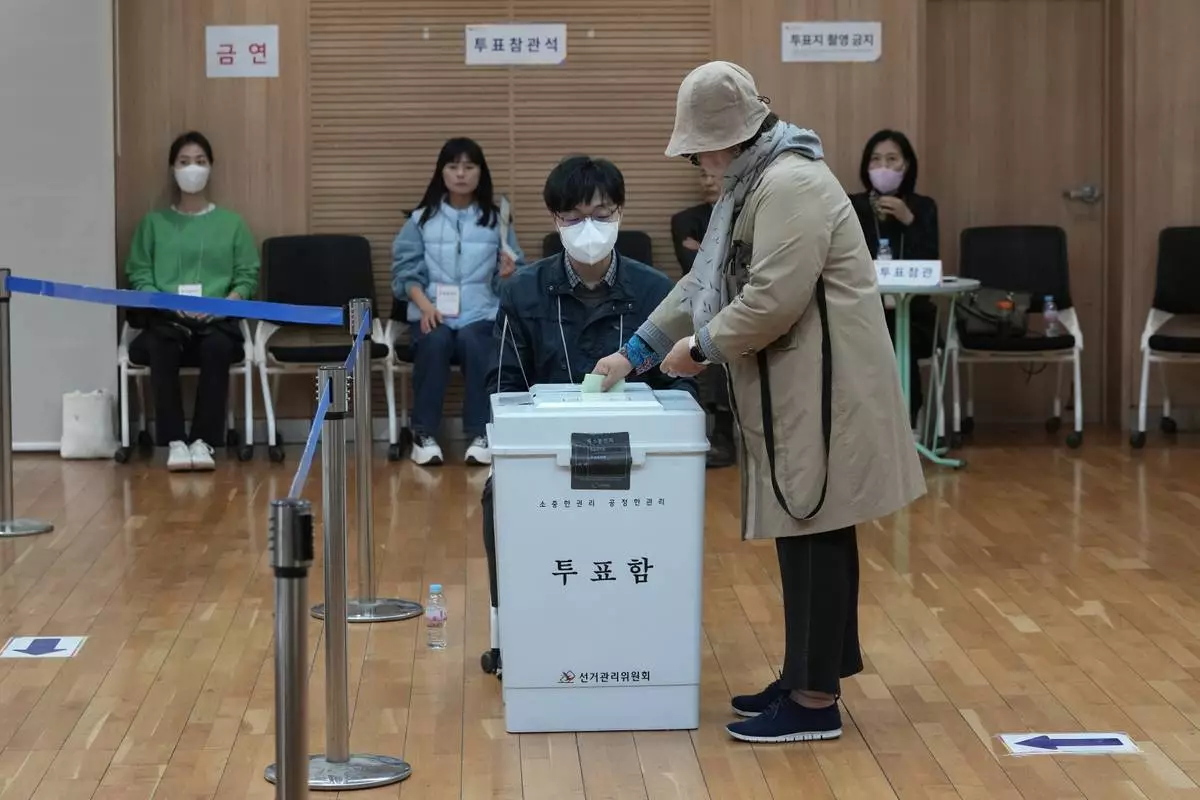
FILE - A woman casts her vote for the parliamentary election at a polling station in Seoul, South Korea, Wednesday, April 10, 2024. South Korean voters have handed liberals extended opposition control of parliament in what looks like a massive political setback to conservative President Yoon Suk Yeol. Some experts say the results of Wednesday’s parliamentary elections make Yoon “a lame duck” — or even “a dead duck” — for his remaining three years in office. Others disagree, saying Yoon still has many policy levers and could aggressively push his foreign policy agenda. (AP Photo/Ahn Young-joon, File)
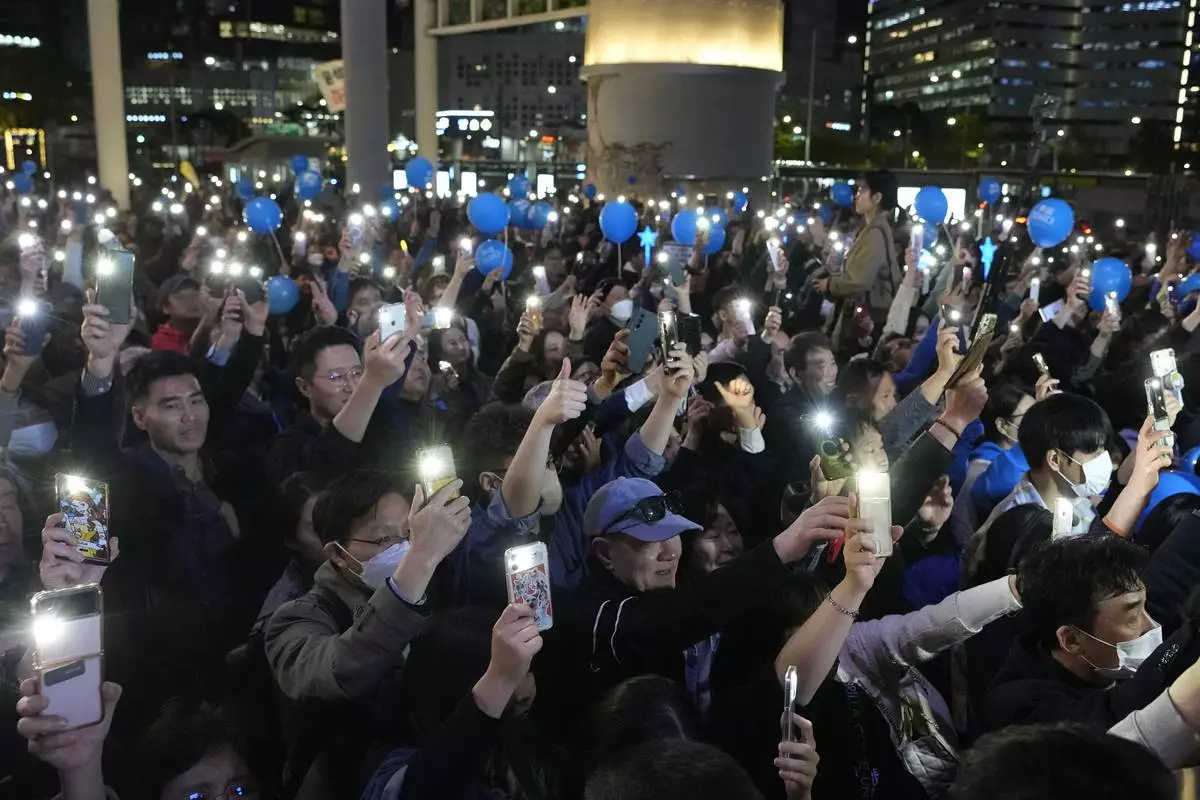
FILE - Supporters of main opposition Democratic Party cheer during the party's parliamentary election campaign in Seoul, South Korea, Tuesday, April 9, 2024. The parliamentary election will be held on April 10. South Korean voters have handed liberals extended opposition control of parliament in what looks like a massive political setback to conservative President Yoon Suk Yeol. Some experts say the results of Wednesday’s parliamentary elections make Yoon “a lame duck” — or even “a dead duck” — for his remaining three years in office. Others disagree, saying Yoon still has many policy levers and could aggressively push his foreign policy agenda. (AP Photo/Ahn Young-joon, File)
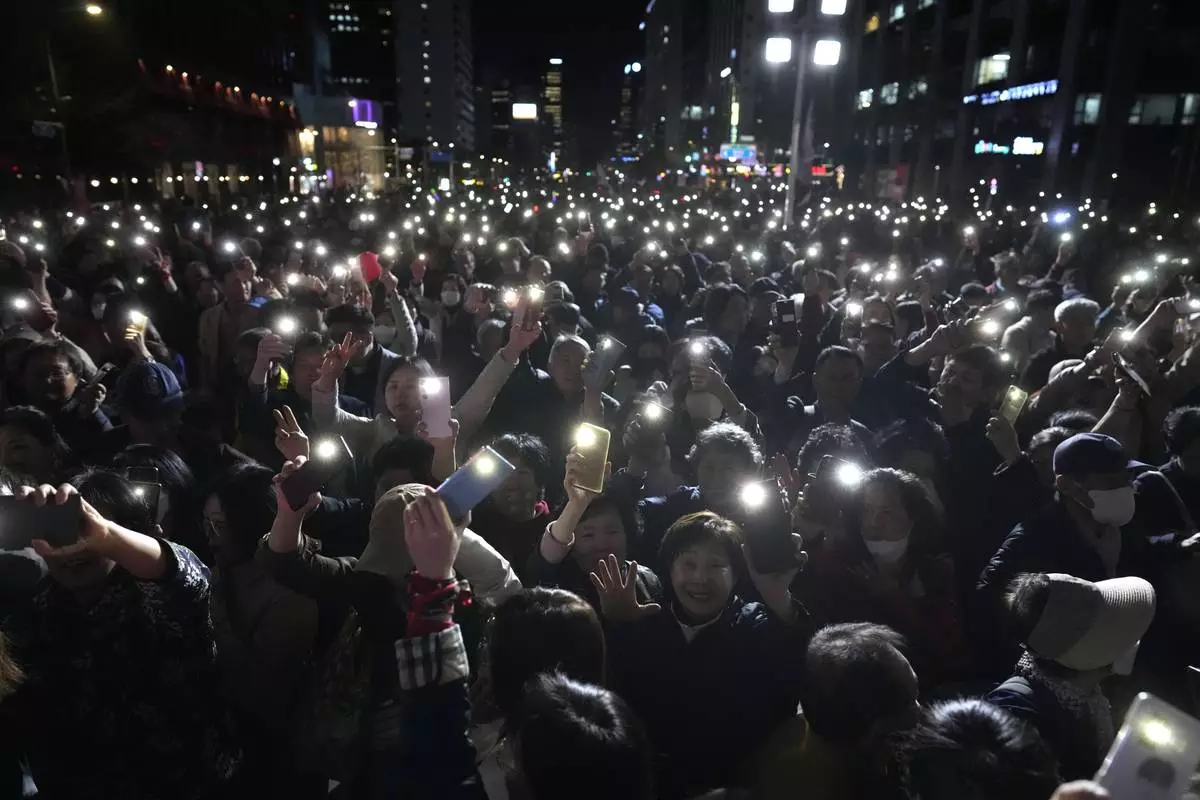
FILE - Supporters of South Korea's ruling People Power Party flash their smartphones' lights during the party's parliamentary election campaign in Seoul, South Korea, Tuesday, April 9, 2024. South Korean voters have handed liberals extended opposition control of parliament in what looks like a massive political setback to conservative President Yoon Suk Yeol. Some experts say the results of Wednesday’s parliamentary elections make Yoon “a lame duck” — or even “a dead duck” — for his remaining three years in office. Others disagree, saying Yoon still has many policy levers and could aggressively push his foreign policy agenda. (AP Photo/Lee Jin-man, File)
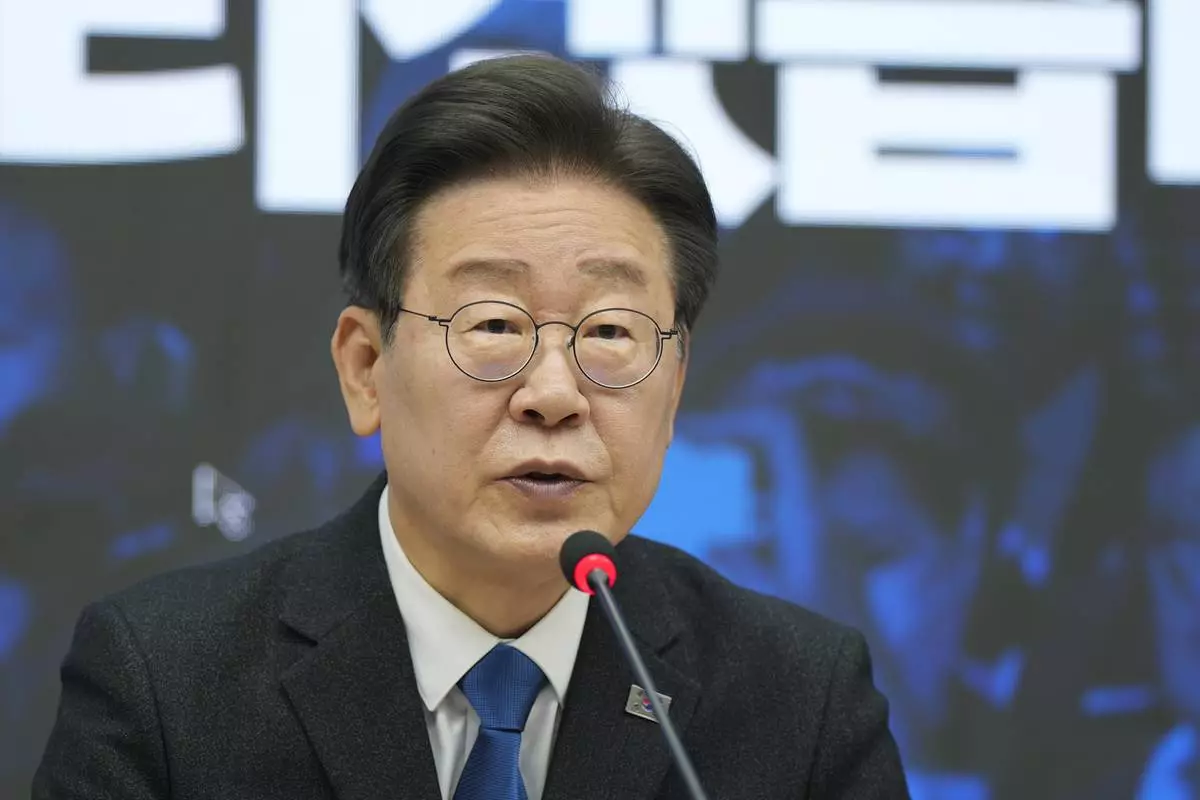
FILE - South Korea's main opposition Democratic Party leader Lee Jae-myung speaks during the disbandment ceremony of the party's election committee for the parliamentary election at the party's headquarters in Seoul, South Korea, Thursday, April 11, 2024. South Korean voters have handed liberals extended opposition control of parliament in what looks like a massive political setback to conservative President Yoon Suk Yeol. Some experts say the results of Wednesday’s parliamentary elections make Yoon “a lame duck” — or even “a dead duck” — for his remaining three years in office. Others disagree, saying Yoon still has many policy levers and could aggressively push his foreign policy agenda. (AP Photo/Lee Jin-man, File)
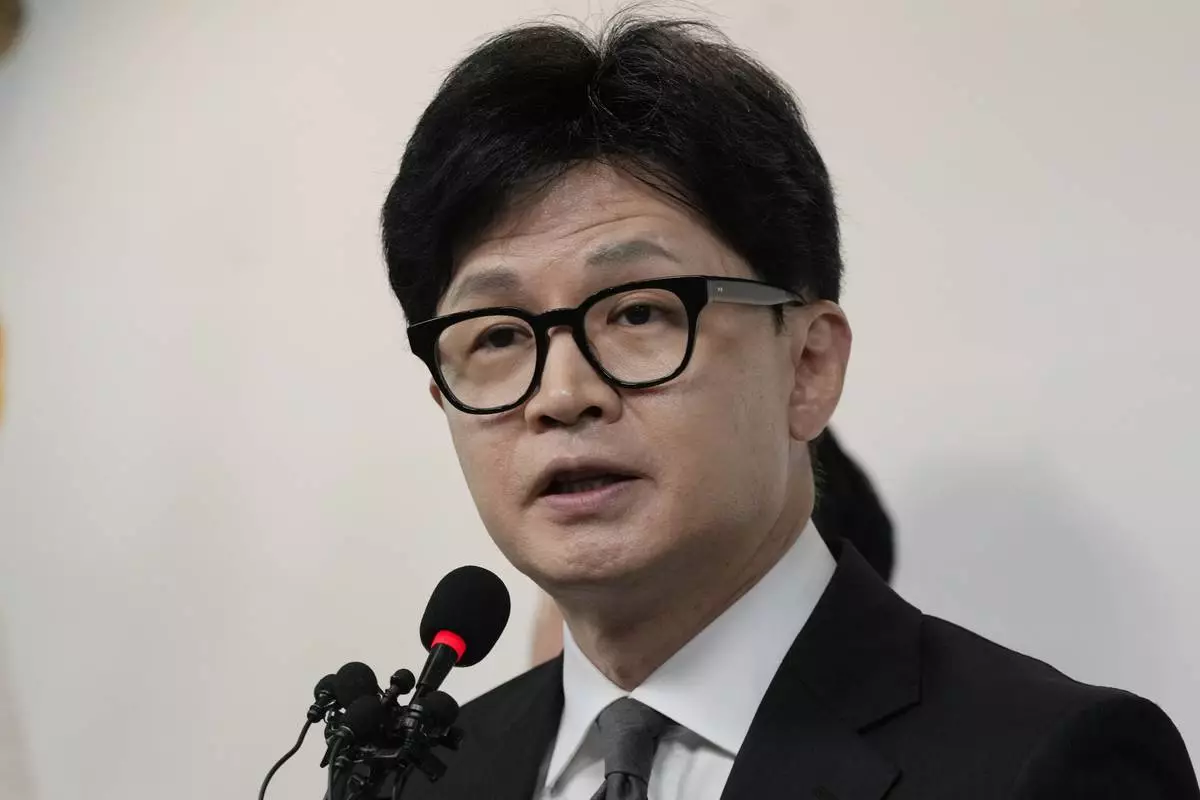
FILE - South Korea's ruling People Power Party's leader Han Dong-hoon speaks during a news conference at the party's headquarters in Seoul, South Korea, Thursday, April 11, 2024. South Korean voters have handed liberals extended opposition control of parliament in what looks like a massive political setback to conservative President Yoon Suk Yeol. Some experts say the results of Wednesday’s parliamentary elections make Yoon “a lame duck” — or even “a dead duck” — for his remaining three years in office. Others disagree, saying Yoon still has many policy levers and could aggressively push his foreign policy agenda. (AP Photo/Ahn Young-joon, File)
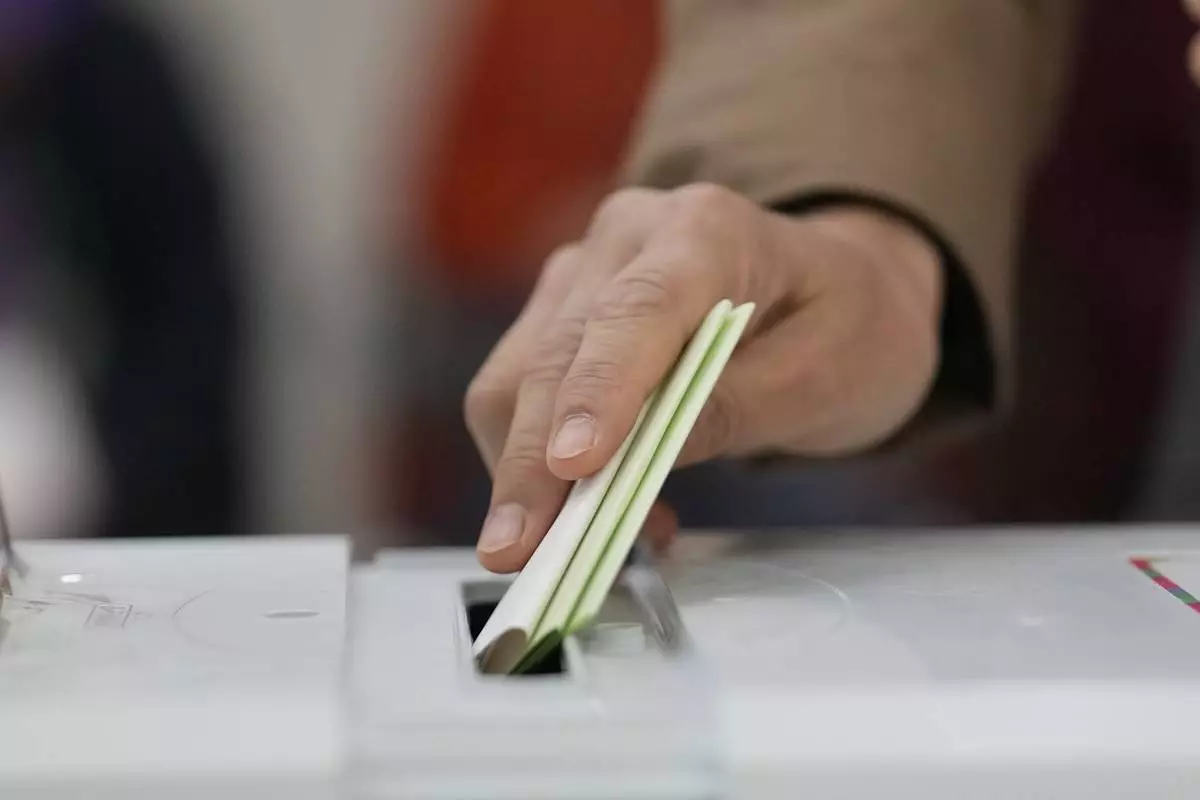
FILE - A voter casts their ballot for the parliamentary election at a local polling station in Seoul, South Korea, Wednesday, April 10, 2024. (AP Photo/Lee Jin-man, File)
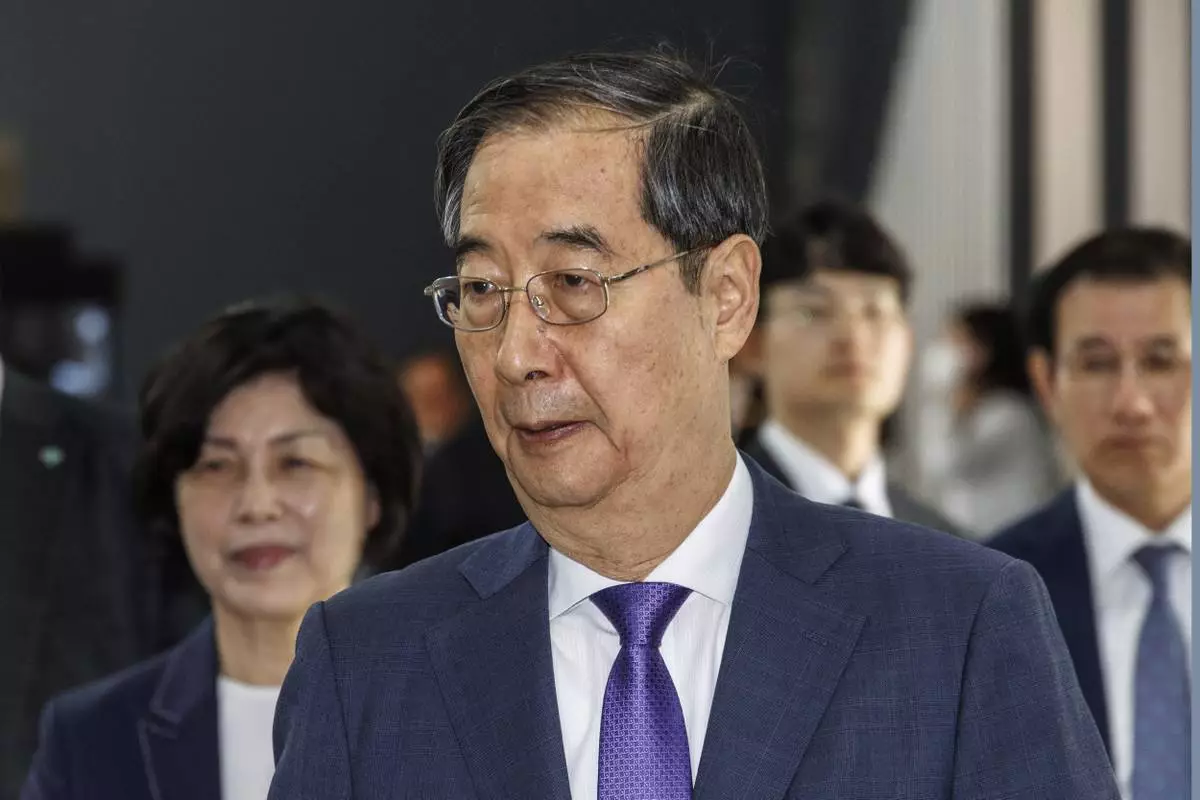
FILE - South Korean Prime Minster Han Duck-soo leaves after attending the commemoration ceremony for the 105th anniversary of the establishment of the Provisional Government of the Republic of Korea in Seoul, South Korea, Thursday, April 11, 2024. South Korean voters have handed liberals extended opposition control of parliament in what looks like a massive political setback to conservative President Yoon Suk Yeol. Some experts say the results of Wednesday’s parliamentary elections make Yoon “a lame duck” — or even “a dead duck” — for his remaining three years in office. Others disagree, saying Yoon still has many policy levers and could aggressively push his foreign policy agenda. (Hang Gwang-mo/Yonhap via AP, File)
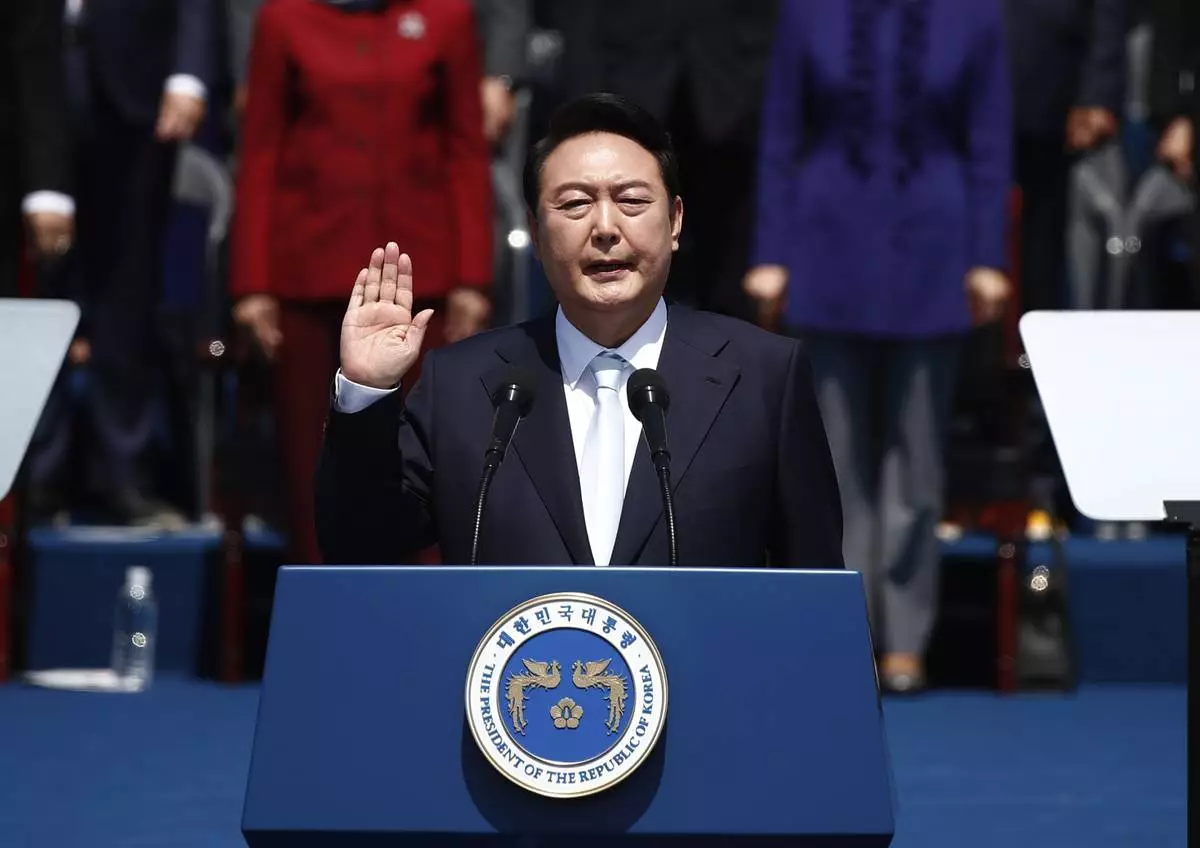
FILE - South Korean President Yoon Suk Yeol takes an oath during his inauguration in front of the National Assembly in Seoul, South Korea, on May 10, 2022. South Korean voters have handed liberals extended opposition control of parliament in what looks like a massive political setback to conservative President Yoon Suk Yeol. Some experts say the results of Wednesday’s parliamentary elections make Yoon “a lame duck” — or even “a dead duck” — for his remaining three years in office. Others disagree, saying Yoon still has many policy levers and could aggressively push his foreign policy agenda. (Jeon Heon-kyun/Pool Photo via AP, File)












